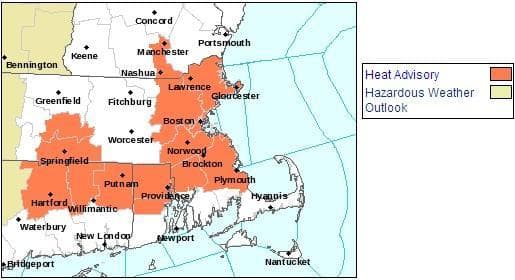Advertisement
Tips To Survive Boston's Heat

Due to expected high temperatures throughout the weekend, Boston Mayor Thomas Menino issued a heat advisory for the city on Friday.
"With several days in a row of this extreme heat, we want everyone, particularly children and the elderly, to take the necessary precautions," Mayor Menino said in a statement Friday. "It's important to stay cool and hydrated, and to keep an eye on our vulnerable neighbors."
The National Weather Service has also issued a heat advisory, effective 11 a.m. to 7 p.m. on Saturday, for eastern Massachusetts and a smaller area in the western part of the state.
"High temperatures [Saturday] will once again reach well into the 90s across most locations," the NWS wrote. "The peak of the heat and humidity will occur [Saturday] afternoon between 1 p.m. and 6 p.m."
The NWS noted that the heat combined with high humidity will results in weather that feels as if it is at or just above 100 degrees.
Here are some important tips to keep yourself safe and cool.
Boston's Heat Emergency Fact Sheet
Find cooling centers and pools and water spray areas in the city.
They city highlights these important points:
Do
- Drink lots of water and stay hydrated
- Check on elderly persons
- Rest often in shady areas
Don't
- Underestimate the seriousness of heat-related emergencies!
- Drink alcoholic or caffeinated beverages
- Overexert yourself or work outside without taking breaks
More Dos And Don'ts
The following is an excerpt from the EPA's Excessive Heat Events Guidebook (PDF).
Do
- Use air conditioners or spend time in air-conditioned locations such as malls and libraries
- Use portable electric fans to exhaust hot air from rooms or draw in cooler air
- Minimize direct exposure to the sun
- Stay hydrated — regularly drink water or other nonalcoholic fluids
- Eat light, cool, easy-to-digest foods such as fruit or salads
- Wear loose fitting, light-colored clothes
- Check on older, sick, or frail people who may need help responding to the heat
- Know the symptoms of excessive heat exposure and the appropriate responses.
Don’t
- Direct the flow of portable electric fans toward yourself when room temperature is hotter than 90°F
- Leave children and pets alone in cars for any amount of time
- Drink alcohol to try to stay cool
- Eat heavy, hot, or hard-to-digest foods
- Wear heavy, dark clothing
Signs And Symptoms Of Heat-Related Illness
The following is an excerpt from the National Weather Service's "Heat: A Major Killer."
Heat Cramps
Symptoms: Painful muscle cramps and spasms usually in legs and abdomen, heavy sweating
First Aid: Apply firm pressure on cramping muscles or gentle massage to relieve spasm. Give sips of water. If nausea occurs, discontinue water.
Heat Exhaustion
Symptoms: Heavy sweating; weakness; cool, pale, clammy skin; weak pulse; possible muscle cramps; dizziness; nausea and vomiting; fainting; normal temperature possible
First Aid: Move person to a cooler environment. Remove or loosen clothing. Apply cool, wet cloths. Fan or move victim to air conditioned room. Offer sips of water. If nausea occurs, discontinue water. If vomiting continues, seek immediate medical attention.
Heat Stroke
Symptoms: Altered mental state; possible throbbing headache, confusion, nausea, dizziness, shallow breathing; high body temperature (106°F or higher); skin may be hot and dry, or patient may be sweating; rapid pulse; possible unconsciousness
First Aid: Heat stroke is a severe medical emergency. Summon emergency medical assistance or get the victim to a hospital immediately. Delay can be fatal. Move the victim to a cooler, preferably air-conditioned, environment Reduce body temperature with a water mister and fan or sponging. Use fan if heat index temperatures are below the high 90s. Use extreme caution. If temperature rises again, repeat process. Do NOT give fluids.
This article was originally published on July 05, 2013.
This program aired on July 5, 2013. The audio for this program is not available.